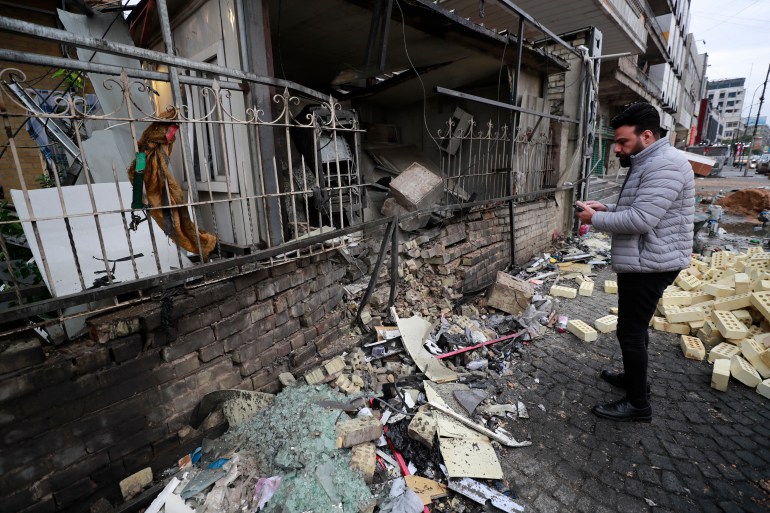Iraq faces growing violence as political rift deepens
Atacks this week underscore the challenges to forming a government away from ethno-sectarian power-sharing arrangement.

Baghdad, Iraq – The threat of worsening violence looms over Baghdad again this week, underscoring the challenges faced by influential Shia leader Muqtada al-Sadr, the leader of parliament’s biggest bloc, in his stated efforts to form a majority government following October’s contested election.
In the latest in a number of attacks to hit the Iraqi capital in just a matter of days, twin explosions late on Sunday targeted two banks associated with Kurdish politicians in central Baghdad’s Karrada district, leaving two people wounded.
It came two days after a hand grenade was thrown at the headquarters of the Taqaddum party, which is led by parliament’s Speaker Mohammed Halbousi. Hours later, a similar attack hit the office of Khamis al-Khanjar, another Sunni politician.
And on January 13, a rocket attack targeting the US embassy in the highly fortified Green Zone wounded several civilians, including a child and a woman.

There has been no claim of responsibility for any of these attacks, which came days after the newly elected parliament’s first session on January 9, during which chaos reigned and physical altercations broke out. The dramatic meeting, which saw Halbousi reelected thanks to support from the Sadrist Movement and the Kurdistan Democratic Party (KDP) – despite strong objection by al-Sadr’s opponents – inaugurated what is expected to be a long period of political wrangling to pick a new president and prime minister.
Analysts say the escalation tests the limits of al-Sadr’s bid to create a government that would, to a certain extent, steer away from the ethno-sectarian power-sharing arrangement established after the United States-led invasion that overthrew Saddam Hussein in 2003.
Known as muhasasa, the system distributes power and state resources between Iraq’s three main religious and ethnic groups – Shia, Sunni and Kurdish – but has been reviled by protesters who in recent years took to the streets to demand a complete overhaul of the country’s political system.
Since his strong election showing in October, al-Sadr has frequently reiterated his commitment to form a “national majority government”, essentially sidelining the Shia Coordination Framework that includes figures such as former Prime Minister Nouri al-Maliki, one of Sadr’s old foes, and the Fatah alliance, the political bloc that houses the pro-Iran Popular Mobilization Forces and which suffered a devastating loss in the elections.
“A majority government can certainly be a responsible and effective government with clear tasks, expectations and responsibilities,” said Kamaran Palani, a research fellow at the Middle East Research Institute. “However, this idea is rejected by the Coordination Framework and every major party besides Sadr’s.”
Some pro-Iran militia groups had previously warned of intensified violence if Sunni and Kurd groups decided to join al-Sadr’s camp.
But al-Sadr – once the leader of the formidable Mahdi Army, a powerful militia group that vehemently fought US forces during Iraq’s occupation and was a major player in the post-invasion sectarian conflict – has stood firm.
“Today, there is no place for sectarianism or ethnic division, but a national majority government where the Shia defend the rights of minorities, the Sunnis and Kurds,” al-Sadr, whose party won 73 seats in the polls, tweeted one day before the first parliamentary session.
“Today there is no place for militias, and everyone will support the army, police and security forces.”
‘No good alternatives’
By defending his Sunni and Kurd allies, al-Sadr is treading further down the road of alienating groups such as Fatah, which, until the recent elections, wielded undeniable levels of power in Iraqi politics. Should al-Sadr managed to form a majority government with his Sunni and Kurd allies, al-Maliki’s State of Law party and Fatah could be pushed into the opposition – a dramatic blow to the status quo.
Analysts say such a rift between Iraq’s Shia groups would be unprecedented, and if either al-Sadr or the Shia Coordination Framework were to be pushed aside, a backlash would be almost inevitable.
“In either scenario, the opposite side will not only try to overthrow the government with legal and political tools but will escalate violently,” warned Lahib Higel, an Iraq analyst at Crisis Group.
“Political assassinations among Shia parties and armed groups hav[e] already occurred and may become more frequent and high-profile.”
Faced with the spectre of instability, some ordinary Iraqis say a majority government would bring about much-needed accountability, which has been largely absent under the current muhasasa system.
“I am not an al-Sadr supporter, but at this point, I’d love to see a majority government led by him because we don’t have any other good alternatives,” said Ahmed al-Haddad, a Baghdad resident.
“Also, if he forms a majority government and still drives the country to chaos, he wouldn’t have any excuse for the next election.”
Yet not all is rosy on the path to establishing a majority government in a country scarred by years of ineffective governance and sectarian violence.
“The whole point behind pushing for a majority government was to move beyond muhasasa,” said Hamzeh Hadad, an Iraqi political analyst. “But the latest election of parliament’s speaker and deputies reveals that we are far from abolishing muhasasa, as long as parties run based on ethno-sectarian identity where no party can win a majority in elections.”